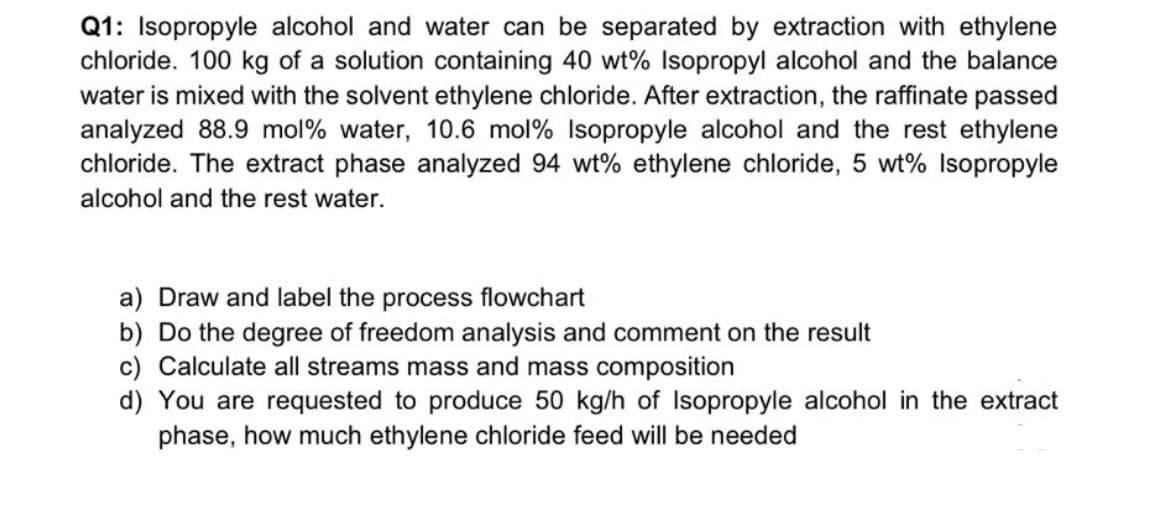Q1: Isopropyle alcohol and water can be separated by extraction with ethylene chloride. 100 kg of a solution containing 40 wt% Isopropyl alcohol and the balance water is mixed with the solvent ethylene chloride. After extraction, the raffinate passed analyzed 88.9 mol% water, 10.6 mol % Isopropyle alcohol and the rest ethylene chloride. The extract phase analyzed 94 wt% ethylene chloride, 5 wt% Isopropyle alcohol and the rest water. a) Draw and label the process flowchart b) Do the degree of freedom analysis and comment on the result c) Calculate all streams mass and mass composition d) You are requested to produce 50 kg/h of Isopropyle alcohol in the extract phase, how much ethylene chloride feed will be needed
Q1: Isopropyle alcohol and water can be separated by extraction with ethylene chloride. 100 kg of a solution containing 40 wt% Isopropyl alcohol and the balance water is mixed with the solvent ethylene chloride. After extraction, the raffinate passed analyzed 88.9 mol% water, 10.6 mol % Isopropyle alcohol and the rest ethylene chloride. The extract phase analyzed 94 wt% ethylene chloride, 5 wt% Isopropyle alcohol and the rest water. a) Draw and label the process flowchart b) Do the degree of freedom analysis and comment on the result c) Calculate all streams mass and mass composition d) You are requested to produce 50 kg/h of Isopropyle alcohol in the extract phase, how much ethylene chloride feed will be needed
Introduction to Chemical Engineering Thermodynamics
8th Edition
ISBN:9781259696527
Author:J.M. Smith Termodinamica en ingenieria quimica, Hendrick C Van Ness, Michael Abbott, Mark Swihart
Publisher:J.M. Smith Termodinamica en ingenieria quimica, Hendrick C Van Ness, Michael Abbott, Mark Swihart
Chapter1: Introduction
Section: Chapter Questions
Problem 1.1P
Related questions
Question

Transcribed Image Text:Q1: Isopropyle alcohol and water can be separated by extraction with ethylene
chloride. 100 kg of a solution containing 40 wt% Isopropyl alcohol and the balance
water is mixed with the solvent ethylene chloride. After extraction, the raffinate passed
analyzed 88.9 mol% water, 10.6 mol% Isopropyle alcohol and the rest ethylene
chloride. The extract phase analyzed 94 wt% ethylene chloride, 5 wt% Isopropyle
alcohol and the rest water.
a) Draw and label the process flowchart
b) Do the degree of freedom analysis and comment on the result
c) Calculate all streams mass and mass composition
d) You are requested to produce 50 kg/h of Isopropyle alcohol in the extract
phase, how much ethylene chloride feed will be needed
Expert Solution
This question has been solved!
Explore an expertly crafted, step-by-step solution for a thorough understanding of key concepts.
Step by step
Solved in 5 steps with 5 images

Recommended textbooks for you

Introduction to Chemical Engineering Thermodynami…
Chemical Engineering
ISBN:
9781259696527
Author:
J.M. Smith Termodinamica en ingenieria quimica, Hendrick C Van Ness, Michael Abbott, Mark Swihart
Publisher:
McGraw-Hill Education

Elementary Principles of Chemical Processes, Bind…
Chemical Engineering
ISBN:
9781118431221
Author:
Richard M. Felder, Ronald W. Rousseau, Lisa G. Bullard
Publisher:
WILEY

Elements of Chemical Reaction Engineering (5th Ed…
Chemical Engineering
ISBN:
9780133887518
Author:
H. Scott Fogler
Publisher:
Prentice Hall

Introduction to Chemical Engineering Thermodynami…
Chemical Engineering
ISBN:
9781259696527
Author:
J.M. Smith Termodinamica en ingenieria quimica, Hendrick C Van Ness, Michael Abbott, Mark Swihart
Publisher:
McGraw-Hill Education

Elementary Principles of Chemical Processes, Bind…
Chemical Engineering
ISBN:
9781118431221
Author:
Richard M. Felder, Ronald W. Rousseau, Lisa G. Bullard
Publisher:
WILEY

Elements of Chemical Reaction Engineering (5th Ed…
Chemical Engineering
ISBN:
9780133887518
Author:
H. Scott Fogler
Publisher:
Prentice Hall


Industrial Plastics: Theory and Applications
Chemical Engineering
ISBN:
9781285061238
Author:
Lokensgard, Erik
Publisher:
Delmar Cengage Learning

Unit Operations of Chemical Engineering
Chemical Engineering
ISBN:
9780072848236
Author:
Warren McCabe, Julian C. Smith, Peter Harriott
Publisher:
McGraw-Hill Companies, The